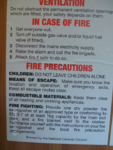Since I started this thread I suppose I should tell you my decision as there's some interesting points of view here. I'm not going to get either an extinguisher nor fire blanket. The most important aspect is preservation of life and this can be addressed by 'getting out as quick as posssible.' In which case the fire detectors provide the most affective solution.
Types of extinguisher, size, positioning are just a few of the variables but none of which I think provides any particular advantage to assist in getting out.
My van is small - there are windows at one end and a door at the other - egress can easily be done through these.
Since we're on the subject of fires - those of us who live in Scotland should be aware of new regulations regarding smoke and fire detectors. Originally legislation was to take affect in Feb 2021 but has been pushed back to Feb 2022 because of the impact of Covid-19. The new regs mean that ALL HOMES must have the following:-
- one smoke alarm installed in the room most frequently used for general daytime living purposes
- one smoke alarm in every circulation space on each storey, such as hallways and landings
- one heat alarm installed in every kitchen
All alarms should be ceiling mounted and interlinked. A CO detector is required but does not need to be linked.
Mine were due for renewal this year anyway.



